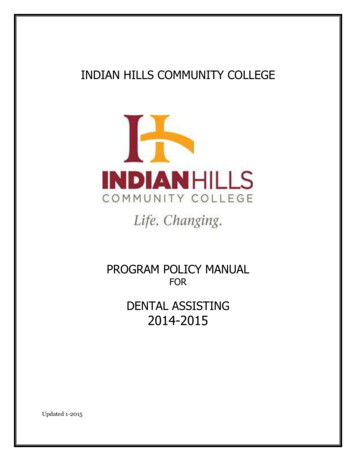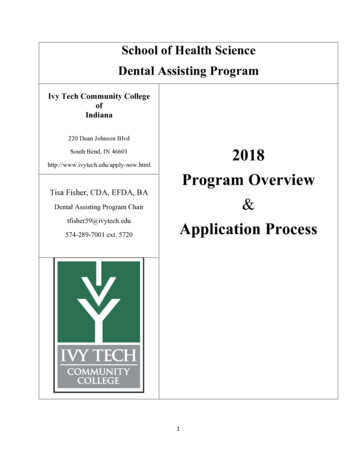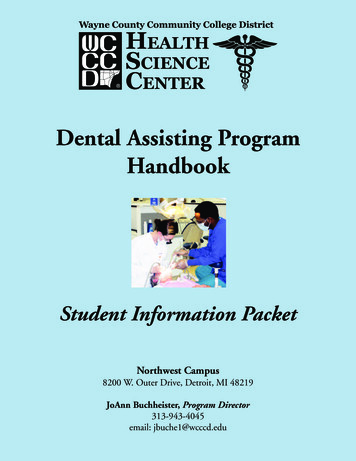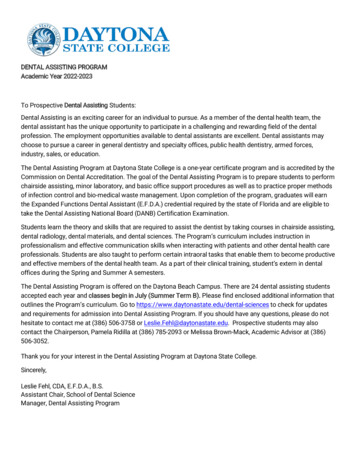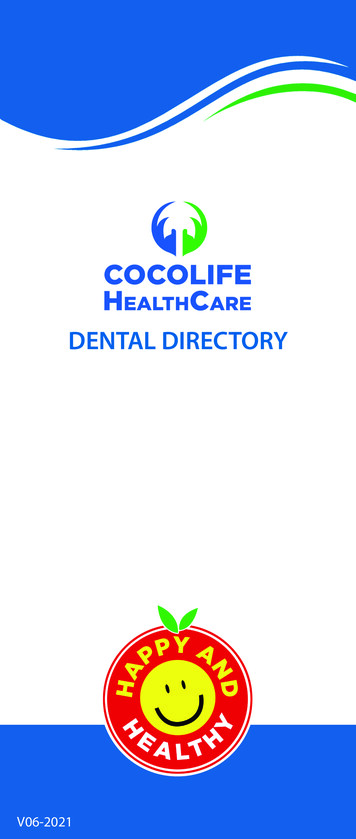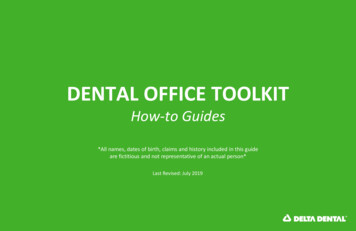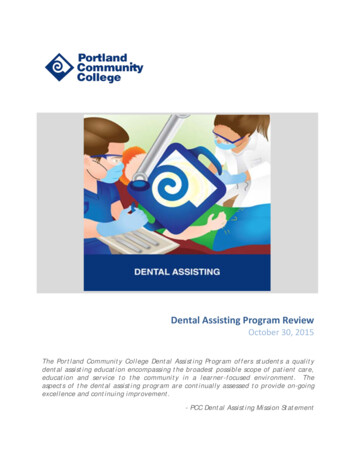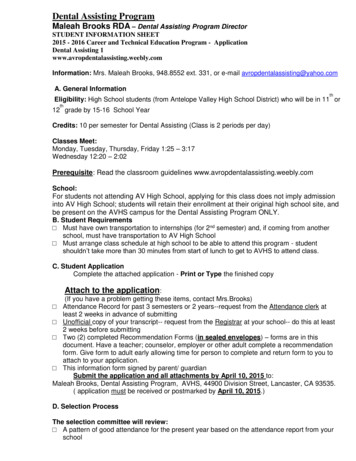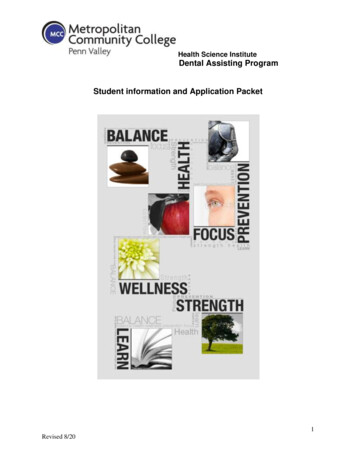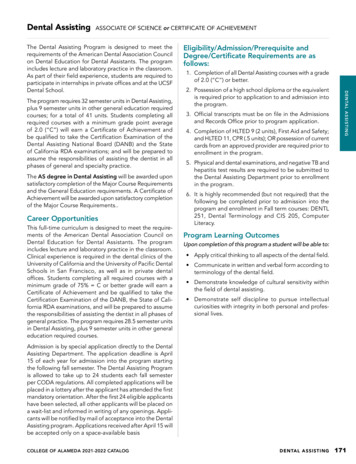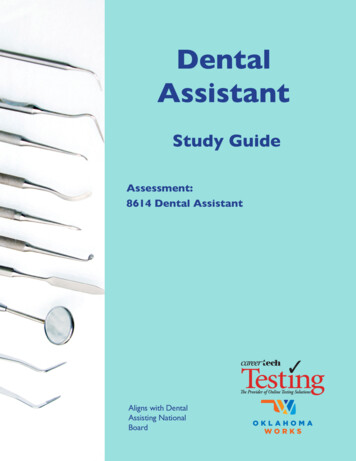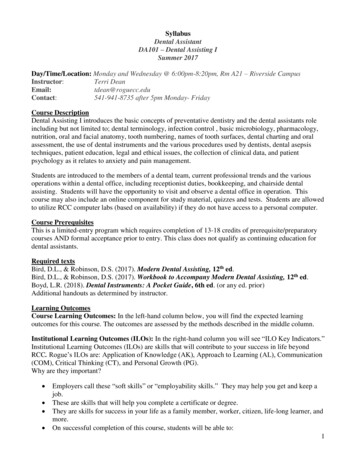
Transcription
SyllabusDental AssistantDA101 – Dental Assisting ISummer 2017Day/Time/Location: Monday and Wednesday @ 6:00pm-8:20pm, Rm A21 – Riverside CampusInstructor:Terri DeanEmail:tdean@roguecc.eduContact:541-941-8735 after 5pm Monday- FridayCourse DescriptionDental Assisting I introduces the basic concepts of preventative dentistry and the dental assistants roleincluding but not limited to; dental terminology, infection control , basic microbiology, pharmacology,nutrition, oral and facial anatomy, tooth numbering, names of tooth surfaces, dental charting and oralassessment, the use of dental instruments and the various procedures used by dentists, dental asepsistechniques, patient education, legal and ethical issues, the collection of clinical data, and patientpsychology as it relates to anxiety and pain management.Students are introduced to the members of a dental team, current professional trends and the variousoperations within a dental office, including receptionist duties, bookkeeping, and chairside dentalassisting. Students will have the opportunity to visit and observe a dental office in operation. Thiscourse may also include an online component for study material, quizzes and tests. Students are allowedto utilize RCC computer labs (based on availability) if they do not have access to a personal computer.Course PrerequisitesThis is a limited-entry program which requires completion of 13-18 credits of prerequisite/preparatorycourses AND formal acceptance prior to entry. This class does not qualify as continuing education fordental assistants.Required textsBird, D.L., & Robinson, D.S. (2017). Modern Dental Assisting, 12th ed.Bird, D.L., & Robinson, D.S. (2017). Workbook to Accompany Modern Dental Assisting, 12th ed.Boyd, L.R. (2018). Dental Instruments: A Pocket Guide, 6th ed. (or any ed. prior)Additional handouts as determined by instructor.Learning OutcomesCourse Learning Outcomes: In the left-hand column below, you will find the expected learningoutcomes for this course. The outcomes are assessed by the methods described in the middle column.Institutional Learning Outcomes (ILOs): In the right-hand column you will see “ILO Key Indicators.”Institutional Learning Outcomes (ILOs) are skills that will contribute to your success in life beyondRCC. Rogue’s ILOs are: Application of Knowledge (AK), Approach to Learning (AL), Communication(COM), Critical Thinking (CT), and Personal Growth (PG).Why are they important? Employers call these “soft skills” or “employability skills.” They may help you get and keep ajob.These are skills that will help you complete a certificate or degree.They are skills for success in your life as a family member, worker, citizen, life-long learner, andmore.On successful completion of this course, students will be able to:1
Intended Outcomes:1. Study and describe the rolesof dental health careprofessionals (dentist, dentalhygienist, chairside assistant,administrative assistant), andexplain how each dental teammember contributes to apatient’s oral health.Assessment Methods:1. Written and/or oralexaminations.2. Demonstrate proficiency indental charting and using dentalterminology. (Including but notlimited to oral and facialanatomy, tooth numberingsystems, names of toothsurfaces, dental charting andoral assessment).2. Written and/or oralexaminations, writtenassignments, observation ofgroup work, and evaluationby instructor.3. Describe the two mostcommon infection oral diseases(caries and periodontal disease),including the cause andmechanism of action.3. Written and/or oralexaminations.4. Define embryology andhistology. Describe prenataldental development, and discussinfluences on development.4. Written and/or oralexaminations.5. Name and describe the tissues 5. Written and/or oralof the teeth. Describe theexaminations.general and specific features ofeach tooth in the permanent andprimary dentitions.Key ILO IndicatorsCOM 2 - Express ideasclearly in oral, written andvisual work.AK 1 - Demonstrate abilityto transfer learning infamiliar and unfamiliarcontexts in order tocomplete tasks.AL 3 - Internalize andassimilates information intonew situations.AK 1 - Demonstrate abilityto transfer learning infamiliar and unfamiliarcontexts in order tocomplete tasks.AL 3 - Internalize andassimilates information intonew situations.COM 2 - Express ideasclearly in oral, written andvisual workCOM 2 - Express ideasclearly in oral, written andvisual work.AK 2 -Integrate previousand new learning, alongwith practical skills, to solveproblems.COM 2 - Express ideasclearly in oral, written andvisual work.AK 1 - Demonstrate abilityto transfer learning infamiliar and unfamiliarcontexts in order tocomplete tasks.AL 3 - Internalize andassimilates information intonew situations.COM 2 - Express ideasclearly in oral, written andvisual work.AK 2 -Integrate previousand new learning, alongwith practical skills, to solveproblems.2
Intended Outcomes:6. Name and identify thelandmarks of the face. Describethe action of thetemporomandibular joint.Assessment Methods6. Written and/or oralexaminations.7. Describe the principles ofbasic nutrition.7. Written and/or oralexaminations.8. Identify common dental handinstruments, and explain howthey are used in deliveringdental care. Identify thedifferences between high-speedand slow-speed dentalhandpieces, and explain howthey are used in deliveringdental care.8. Written and/or oralexaminations.9. Describe the properties ofcommon dental materials,identifying potential hazards(through MSDS sheets orstandard warning labels) andaddressing public controversies(such as mercury fillings andfluoride).9. Written and/or oralexaminations.10. Describe the differencesbetween dental laws and thedental code of ethics, anddescribe the major componentsof each branch.10. Written and/or oralexaminations, writtenassignment.Key ISLO Indicators:AK 2 -Integrate previousand new learning, alongwith practical skills, to solveproblems.AL 3 - Internalize andassimilates information intonew situations.AK 2 -Integrate previousand new learning, alongwith practical skills, to solveproblems.COM 2 - Express ideasclearly in oral, written andvisual work.AK 2 - Integrate previousand new learning, alongwith practical skills, to solveproblems.AL 5 – Use technologicaltools to research newinformation, solveproblems, and communicateeffectively.AK 2 - Integrate previousand new learning, alongwith practical skills, to solveproblems.AL 5 - Use technologicaltools to research newinformation, solveproblems, and communicateeffectively.AK 5 - Demonstrate theability to adhere to personaland industry safetystandards.AK 2 - Integrate previousand new learning, alongwith practical skills, to solveproblems.AL 5 - Use technologicaltools to research newinformation, solveproblems, and communicateeffectively.3
Intended Outcomes:11. Identify the basic principlesof pharmacology and basicmicrobiology.Assessment Methods:11. Written and/or oralexaminations andevaluation of small groupwork by instructor.12. Describe how to apply theprinciples of dental asepsis inperforming dental assistingduties.12. Written and/or oralexaminations.13. Describe the dangers andbenefits of using x-raytechnology in a dental office.13. Written and/or oralexaminations.14. Discuss the impact ofcultural, ethnic, racialbackgrounds, geographic, andlearning styles on the deliveryof dental care, and utilizeconcepts when providing patientcare.14. Written and/or oralexaminations.15. Adhere to facility and dental 15. Evaluation ofassisting program policies, e.g.performance by instructor.attendance, working as memberof a team, responding tofeedback unemotionally andnon-defensively, acting ethicallyand within scope of practice,utilization of standardprecautions throughout theprogram.Key ISLO IndicatorsCOM 2 - Express ideasclearly in oral, written andvisual work.AK 1 - Demonstrate abilityto transfer learning infamiliar and unfamiliarcontexts in order tocomplete tasks.AL 3 - Internalize andassimilates informationinto new situations.COM 2 - Express ideasclearly in oral, written andvisual work.PG 1 - Act as a responsiblemember of a community.AK 1 - Demonstrate abilityto transfer learning infamiliar and unfamiliarcontexts in order tocomplete tasks.AL 3 - Internalize andassimilates information intonew situations.COM 4 - Work respectfullywith others by consideringopposing view-points anddifferent culturalperspectives in order to findcommonalities forcooperation and to aidproductivity.PG 1 - Act as a responsiblemember of a community.PG 6 - Adhere to a strongwork ethic and is able tonegotiate and abide by theterms of agreement thatdefines one’s employment.4
Grading InformationMidterm (week 4)Daily Quiz (14 quizzes @ 20 pts ea.)ProjectAttendance in Class (30 pts per class)Final (closed book, in class)Vocabulary & Tooth numberingWorkbookTotal points possible120 points (12% of grade)280 points (28% of grade)100 points (10% of grade)480 points (48% of grade)200 points (20 % of grade)80 points (8% of grade)40 points (4% of grade)1300 points1300 - 1170 points A1169 - 1039 points B1038 – 908 points C907 – 777 points D776 - 1000 points FCourse Outline:Note: This is subject to change.Week 1Week 2Mon July 10:VocabularyChapter 1 – History of DentistryChapter 3 – The Dental TeamWed July 12Chapter 25 – ErgonomicsChapter 32 – The Dental OfficeChapter 19 – Disease Transmission and Infection ControlChapter 20 – Principals of DisinfectionMon. July 17Wed. July 19Week 3Mon. July 24Wed. July 26Week 4Mon. July 31Wed. Aug. 2Chapter 21 – Instrument Processing and SterilizationChapter 24 - Dental Unit WaterlinesChapter 11 – DentitionChapter 12 – Tooth MorphologyChapter 13 – Dental CariesChapter 28 – Oral Diagnosis and Treatment PlanningIntro to ChartingChapter 14 – PeriodonticsChapter 15 – Preventative DentistryMidterm Opens on BlackboardChapter 10 – Landmarks of the Face and Oral CavityChapter 16 - NutritionCharting exercise5
Week 5Week 6Mon. Aug. 7Chapter 26 – Patient RecordChapter 27 – Vital SignsWed. Aug. 9Chapter 33 – Delivering Dental CareChapter 34 – Hand InstrumentsChapter 29 – The special needs patientChapter 30 – PharmacologyMon. Aug. 14Wed. Aug. 16Week 7Week 8Mon. Aug. 21Chapter 31 – Medical EmergenciesChapter 35 – Dental HandpiecesCharting exerciseChapter 36 – Moisture ControlChapter 37 – Anesthesia and Pain ControlWed. Aug. 23Chapter 48 – General DentistryChapter 49 – Matrix SystemsMon. Aug. 28Chapter 61 – Communication in the Dental OfficeChapter 38 – Foundations of RadiologyWed. Aug. 30Final Exam in ClassEXPECTATIONS FOR STUDENTSExpectations for classroom behaviors are outlined in the Student Code of Conduct, available in thecatalog, schedule, and online. Students may not engage in any activity which the instructor deemsdisruptive or counterproductive to the goals of the class. Instructors have the right to remove studentsfrom class for not following the Code of Conduct or other specified classroom rules outlined in theDental Assistant Student Handbook.AttendanceStudents are expected to attend all class meetings unless an excused absence has been arranged inadvance (further information is listed below). If you are unable to attend a class, please notify me viaemail or phone. Administrative Drop: students who do not attend at least 50% of the class sessions during thefirst week of school and who do not contact the instructor to indicate a plan to attend will beautomatically dropped from the class during the 2nd week of the term. Refund policy: Students dropping a class by 11:59 p.m. on Wednesday of the second week ofthe term get a full refund. After that there is no refund. Withdrawal from class: A student may withdraw from a class between the Thursday of Week2 and the Friday of Week 8 at 11:59 pm. (Week 5 during summer term). A grade of W will beassigned.Academic HonestyCheating, plagiarism, and other acts of academic dishonesty are regarded as serious offenses. Instructorshave the right to take action on any suspected acts of academic dishonesty. Depending on the nature ofthe offense, serious penalties may be imposed, ranging from loss of points to expulsion from the class orcollege.6
Classroom BehaviorExpectations for classroom behavior are outlined in the Student Code of Conduct, available in thecatalog, schedule, and online. Students may not engage in any activity which the instructor deemsdisruptive or counterproductive to the goals of the class. Instructors have the right to remove studentsfrom class for not following the Code of Conduct or other specified classroom rules. Expectations forbehavior in online classes are similar to what is required in the classroom.Student Evaluations of this Course: “What Do You Think?”Students enrolled in all credit (and some non-credit) courses will receive an RCC email around the 8thweek of each term to complete online evaluations on each course they are enrolled in. Full instructionsfor accessing and completing the evaluations will be in the reminder email. These evaluations areanonymous and will not be released to the teachers until after the term is over. They provide valuablefeedback to faculty about your experiences in and impressions of the course.Disability ServicesAny student who feels that he or she may need academic accommodations for a disability, such asvision, hearing, orthopedic, learning disabilities, psychological or other medical conditions, should makean appointment with the Disability Services Office.Redwood Campus (Wiseman Tutoring Center):Phone: 541-956-7337; Fax: 541-471-3550; Oregon Relay Service: 7-1-1Riverside and Table Rock Campuses (main office: Riverside Campus B-9):Phone: 541-245-7537; Fax: 541-245-7649; Oregon Relay Service: 7-1-1For more information, go to ination, Harassment and Sexual Violence PoliciesRCC is committed to ensure that its learning and working environments are free from all forms ofdiscrimination and harassment, including sexual harassment. Therefore, it is a violation of Collegepolicy for any employee, student or third-party at RCC to engage in these practices.In addition, RCC has a zero tolerance for sexual assault, stalking, intimate partner or domestic violence,dating violence and workplace violence. Anyone found participating in any of these activities will besubject to disciplinary action and prosecuted in accordance with RCC policies and procedures andOregon state laws. For more information, go to uctSafetyThe College assists in keeping the campus safe, but a safe campus can only be achieved through theefforts and cooperation of all students, faculty, and staff. For information on safety services, go tohttps://www.roguecc.edu/safety/Smoking restrictions (Board policy)Smoking is not permitted on the premises of Rogue Community College except in designated areas. Formore information go to: http://web.roguecc.edu/board-policies7
1 Syllabus Dental Assistant DA101 - Dental Assisting I Summer 2017 Day/Time/Location: Monday and Wednesday @ 6:00pm-8:20pm, Rm A21 - Riverside Campus Instructor: Terri Dean Email: tdean@roguecc.edu Contact: 541-941-8735 after 5pm Monday- Friday Course Description Dental Assisting I introduces the basic concepts of preventative dentistry and the dental assistants role
